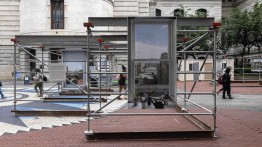The City as Seen by Its Workers
POSTED ON: June 12, 2025
Emilio Martínez Poppe, a 2016 graduate of The Cooper Union School of Art, debuted a temporary exhibition in Philadelphia’s City Hall Courtyard. Civic Views, the artist’s first large-scale public art installation, was commissioned by Mural Arts Philadelphia and celebrates Philadelphia’s municipal workers by exploring their diverse perspectives on the city through poetic documentation of what they see from their office windows.
Over the past two years, Martínez Poppe visited more than 20 agencies across Philadelphia to interview staff and photograph views from inside municipal buildings looking out at the city. The culminating exhibition, curated by Jameson Paige, was accompanied by a series of public programs highlighting the work of scholars, labor organizers, elected officials, and city employees as they articulate the importance of the public sector. The centerpiece of Civic Views—an expansive installation of photographs, text, and scaffolding armatures—was on view at City Hall this month.
Martínez Poppe, who works in New York City’s Department of Cultural Affairs, says the goal of the project is to humanize vital public sector work, an idea the artist began exploring in 2021 while pursuing dual graduate degrees in fine arts and urban planning at the University of Pennsylvania. The project was initially inspired by America’s oldest surviving photographic image, a daguerreotype captured in 1839 when US Mint employee Joseph Saxton pointed a handmade camera out his office window. Last year, Martínez Poppe tracked down the location of the window in Center City Philadelphia to recreate Saxton’s perspective. The project has since expanded to more than forty window views photographed from municipal buildings across the city.
“I wanted to understand how the people who care for ... and manage the city are oriented in their own work,” Martínez Poppe told The Philadelphia Inquirer. Challenging the perception of government as a faceless bureaucracy, the artist asked city employees about their career paths: “How did they arrive to fill the positions that they occupy, and what kind of disposition do they carry when they are doing the work?”
At a time of increasing hostility toward the public sector, Mural Arts says Civic Views “champions the people, buildings, and ethics that keep city government running.” As the Trump administration has moved to eliminate federal agencies and terminate thousands of federal jobs, Martínez Poppe wants people to reconsider the value of civil service and see the city through the eyes of its public workers. “Thinking about a full-scale assault on the public sector at the federal level and then here thinking about it at the municipal level, what does it mean to lose our public services that help us come together collectively to imagine who we are,” the School of Art graduate said in an interview with WHYY. “That’s what the public sector offers us. That’s the promise.”
With the exhibition's run in the City Hall Courtyard now ended, a version of Civic Views will be installed for long-term public view across the street at the Municipal Services Building. Martínez Poppe also aims to expand the project into a book.







